new posts in all blogs
Viewing: Blog Posts Tagged with: Brian Francis Slattery, Most Recent at Top [Help]
Results 1 - 11 of 11
How to use this Page
You are viewing the most recent posts tagged with the words: Brian Francis Slattery in the JacketFlap blog reader. What is a tag? Think of a tag as a keyword or category label. Tags can both help you find posts on JacketFlap.com as well as provide an easy way for you to "remember" and classify posts for later recall. Try adding a tag yourself by clicking "Add a tag" below a post's header. Scroll down through the list of Recent Posts in the left column and click on a post title that sounds interesting. You can view all posts from a specific blog by clicking the Blog name in the right column, or you can click a 'More Posts from this Blog' link in any individual post.
Melinda Palacio
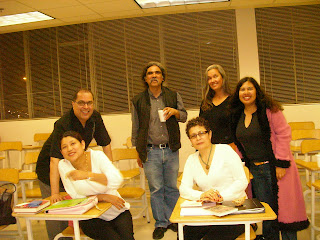 |
One of the first Latinos in Lotusland readings at Cal State L.A. 2008
with Reyna Grande, Daniel Olivas, Danny Romero, Helena Maria Viramontes, Lisa Alvarez, and Melinda Palacio |
September snuck up on me. It's cool breeze taunted the shortened hours of sunshine. This month can't seem to make up its mind. Here in Santa Barbara, we've had beautiful, beach-weather days and cold, foggy, outright down pouring rain. September rolled around and I even forgot to update my website. I know there's at least one La Bloga reader who missed the small announcement I had in my post two weeks ago, in August, when I announced my upcoming memoir writing workshop at Sowing of the Seeds in Tucson last Saturday. women knew what to do and were very receptive to the memoir writing workshop I gave. It was a pleasure working with them.
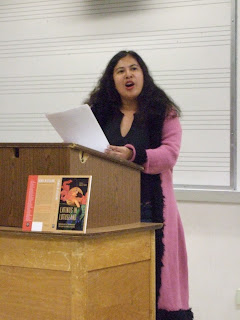 |
| Reading from Latinos in Lotusland in 2008 |
However, all of the success I've enjoyed with my writing, including posting for La Bloga, would not be possible without the support of our Lotuslandeditor, Daniel Olivas. Before he joined La Bloga, Daniel accepted my first published short story. I was determined to be in the anthology. I didn't know much about the publishing world, but somehow I knew that being including in an anthology of Latino writing would help me achieve my goals. I sent Daniel three short stories until he replied and said he loved, "The Last Time," the short fiction that launched my career. In 2006, I had one poem published and one short story accepted for publication. I used these credits to apply to the PEN USA Emerging Voices Fellowship in 2007. By the time the anthology was finally published in 2008, I had dozens of short stories and poems published. But I always remained in awe of our editor, Daniel Olivas, who had published several books. Gracias, Daniel. He didn't know it at the time, but he helped launch my novel Ocotillo Dreams and my new poetry book, How Fire Is a Story, Waiting.
I've asked some of the contributors, many who will be part of tomorrow's celebration to offer some words about their Lotusland experience and how they first met La Bloga's Daniel Olivas.
First, some words from La Bloga's Rudy Ch. Garcia:
Gente! Please give your attention to these few words, no le hace que no pueden ver mi cara chida.
On the occasion of another Calif. Lotuslandevent I so wish I could attend, in my absence, please consider giving Daniel Olivas one chingaso round of applause [perdóname]. I don't ask that you do this simply because he is the Lotusland editor. Or for doing the great editing that might make it a classic. Nor do I ask you only recognize him for his own fine literary work. To mix my metaphors, please give him a hand because of his role como un sembrador de una onda nueva en la literature chicana, y las obras latinas.
In a period when the concept of Chicano literature was already struggling to break into genres that had been the province of non-Latinos, Daniel had created his own, and, through this anthology, he editorially embraced others' speculative cuentos that were not usually thought of as "our" literature. By doing so, he imparted appreciation and respectability to escritores nuevos who risked exclusion because they were judged to be: "not literary enough." I am but one contributor whose writing career was boosted by my few pages in the anthology. And now I understand que uno de los días mejores fue cuándo encontré a nerdy looking, prieto attorney de Califas who wanted to join La Bloga. My life, and those of others, will never be the same. Que viva Daniel Olivas!
signed by Rudy Ch. Garcia, un-shamefully self-promoting his first novel, The Closet of Discarded Dreams
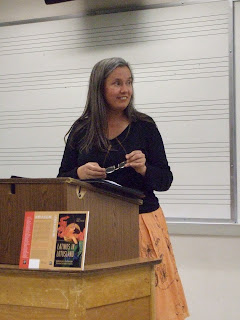 |
| Lisa Alvarez |
The call I saw for Latinos in Lotusland motivated me to take a look at what I had - part of a novel set in and around Los Angeles that had been languishing. I chose a chapter, "Sweet Time," that seemed to stand alone and sent it off to Daniel who accepted it almost immediately. I was surprised. I had not submitted work in quite awhile and was drifting a bit. Inclusion in the anthology encouraged me to look once again at my work and, while I eventually abandoned the novel my Lotusland contribution is taken from, I embarked on a project that I feel much more strongly about: a series of connected short stories set in 1980s Los Angeles that profile a circle of female friends, all political activists trying to do the right thing. The stories start in the 80s and end in the here and now, with my once punk rock artist activists growing older and try to reconcile their past idealism with their present.
The collection is tentatively titled "Ocean Park" after the painting series by Richard Diebenkorn. I am interested to see if a writer can do a bit of what Diebenkorn does so well on canvas - capture a time, a light, a mood, a community. Two of the stories have been published so far, one in the Santa Monica Review and the other in Faultline.
From Sandra Ramos O'Briant
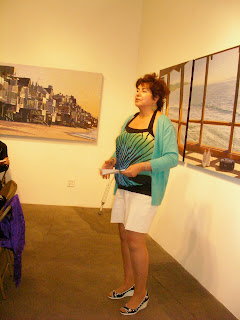 |
Sandra Ramos O'Briant at the Patricia Correa Gallery
Latinos in Lotusland Book Party with Bilingual Press |
I met Daniel on Zoetrope; we'd reviewed short stories for each other. He put out the call for his anthology in 2006, I think. Being part of it enriched my life. Not only did I have the opportunity to participate in readings, but I met interesting writers and became part of a community. The book is used in university classes and students have written to me about "Lana Turner Slept Here." At the time of publication, I'd had a few stories published, but I was working on The Sandoval Sisters, and wrote short stories to challenge myself. I've had over 20 short stories published since then, and that novel is now a reality. My main concern in submitting to his anthology was whether my story would be "Latino" enough. Believe me, that's a legitimate concern for a kid growing up in Santa Fe with a Mexican mother, but O'Briant for a last name. "Prove it!" was the chant I heard on the playground and in school hallways. There's not enough space here, nor would my description pass censorship laws, to explain how I tried to prove myself back then. But, in the here and now, I do it with my writing. My characters evolve, as does Joe Salazar in "Lana Turner Slept Here," as do the The Sandoval Sisters, as do I.
Sandra Ramos O'Briant
The Sandoval Sisters' Secret of Old Blood (La Gente Press, September 2012)
From El Professor, Michael Jaime-Becerra
 |
| Michael Jaime-Becerra |
For me, Latinos in Lotusland continues as a wonderful mosaic, a validation of the richness and diversity in our stories and in our storytellers. Gratitude always to Daniel Olivas, the editor with both the vision and the energy to bring it all together.
I had met Daniel a few years prior to Lotusland and had also invited him to read at UCR as part of our Writers Week conference. This was 2004 or 2005.
As I recall it, when he put out the call for submissions, I was in the middle of writing my second book and I didn't have anything ready for public viewing yet. Daniel graciously agreed to include a reprint from Ladies' Night, my first book.
--Michael Jaime-Becerra
Join Daniel Olivas, Michael Jaime-Becerra, Lisa Alvarez, Sandra Ramos O'Briant, Estella Gonzalez, and Melinda Palacio at the Latinos in Lotusland panel at the Autry, Saturday, September 15 at 2pm.
Countdown to Publication...
New York Days Ahead...
If you find yourself in New York at the Brooklyn Book Festival, September 23, I will be at the Las Comadres Booth from noon to 2pm, along with Reyna Grande, Lucrecia Guerrero, and Toni Margarita Plummer. Join the Party. The next hour includes a reading by Luis Alberto Urrea.
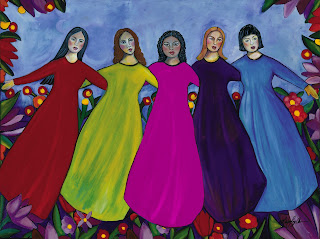 |
| Las Comadres y Compadres Writers Conference, October 6, 2012 New York |
On October 6, aspiring writers can purse and polish their own dreams of publishing their novel, collection of stories, memoir, or book of poetry at the Las Comadres y Compadres Writers Conference in New York, held at Medgar Evers College, CUNY, Brooklyn. Registration for writers and vendors is now open for the conference. I will be on a poetry panel.
Melinda Palacio
For those that cannot take advantage of the Comadres Writers Conference, a new book, out next month, Count on Me: Tales ofSisterhoods and Fierce Friendships, offers readers a view into the role of comadres and compadres for authors; there's one essay by compadre Luis Alberto Urrea.
Nora Comstock is always busy, but the next two months might prove her busiest with the writers conference and publication launch party of Count on Me at La Casa Azul Bookstore, September 20, 6 p.m. to 8 p.m. 143 E. 103rd Street, NY, NY.
Comstock, the founder of the international and national group, talks about seeing the book in print.
"I have the advanced reading copy and I sleep with it! It is the most amazing feeling to have it actually finished. It seems like a dream. Everything seemed to get done so fast. When you work with consummate professionals, it is a seamless process. I did not expect it to go so smoothly. Writing the intro was very hard both because I am not a writer and because I had so much to say. I kept trying to put all my feelings and thoughts into a small space. They had to cut a lot."
The book is inspiring to anyone who's ever relied on a friend, not just any friend, but the kind of friend you know will be there for you no matter what. One of my good friends and comadres, Reyna Grande, is in the anthology. Reyna's moving memoir, The Distance Between Us, is garnering rave reviews. A modified chapter from her memoir is in Count on Me. Reyna writes about her teacher and mentor, Diana Savas. Diana is a perfect example of a comadre because she immediately recognized that Reyna needed more than a friend and offered to fulfill the role of family, confidant and nurturer in order to support a young woman, very much like herself, who wanted to do well in college. Thanks to her comadre Diana, Reyna went on to publish two novels and a memoir and participate in the Las Comadres Book Club as an author and presenter. Reyna says she felt very honored to contribute to the anthology:
"The topic was especially appealing because I immediately thought of my former teacher and mentor as the subject of my piece. I'm grateful to las Comadres for giving me the chance to thank my teacher publicly for what she did for me."
Upcoming Events in Los Angeles, CA
September 4, Reyna Grande presents her new memoir, The Distance Between Us, Tuesday at Vroman's at 7pm, 695 E. Colorado Blvd, Pasadena CA 91101.
(You can wish Reyna a happy birthday, September 7)
Countdown to publication...

On March 28, a merry gang of writers converged on one of the country's great book stores - Librería Martinez in Santa Ana, California - as guests of the inimitable Reuben Martinez to read from, sign copies of, and show off the great writing in Latinos in Lotusland, Daniel Olivas' labor of love. Regular readers of La Bloga know all about Lotusland and have several copies in their homes, some ready to be presented as gifts in another month or two to the happy graduate, the blushing bride, or the returning vet. Those of you not yet hip to Lotusland, get with it, homes. You owe it to the right side of your brain to start munching on the savory delectables that Daniel collected in the anthology.
Have you noticed that the economy has the hurts? These days many more people than we care to think about are having to choose between the light bill or the rent. You can guess what that means for an independent bookseller like Reuben - times are tough, ése. It was with some trepidation then that the merry gang of wordsters made their way to Reuben's shop - what if no one showed up; what if all of Mamacita's stash cash went for an extra package of tortillas for that rainy day; what if Jose and Josie Student needed a li'l somethin' somethin' to get them through upcoming finals and there went all the loose coins from under the couch? What if?
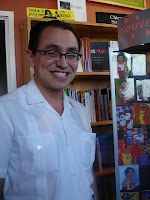
Not to worry. Daniel got the word out - he had some help from folks like Gustavo Arrellano, the Ask A Mexican guy who made it to the reading and looked like he enjoyed himself; that's him to the left, with his now-famous grin. A great, in fact, a fantastic crowd greeted the writers with cheers and laughter and song and even a brass band (well, not really, but it felt that good). And for a couple of hours we managed to ignore the threatening reality of 2009. Oh, we talked about the recession, we just didn't let it keep us down.
Daniel worked so hard during the weeks leading up to March 28 drumming up interest for our event that he showed up at the reading fighting off bronchitis; his voice sounded as rough as Jay Cutler's ugly exit from the Broncos.
But the writers carried on. Bouyed by the spirit of the crowd and Reuben's unflagging enthusiasm, the five presenters spent a few minutes talking about themselves, then reading from their Lotusland selections, then the group answered questions from the crowd. Beer and wine and bottled water flowed like beer and wine and bottled water. Special thanks to Sarah Rafael García, who helped Reuben with the logistics of the event and added her own special touch of class. The Saturday Southern California afternoon was uncommonly sunny and warm but it paled in comparison with the emotional heat in the book store. It was quite a deal. You should'a been there.
The writers in the group were Lisa Alvarez, Victorio Barragán, Alejandro Morales, Manuel Ramos, and Sandra Ramos O'Briant. Here's a group shot (Left to right: Victorio, Daniel, Lisa, Sandra, Manuel, Alejandro).
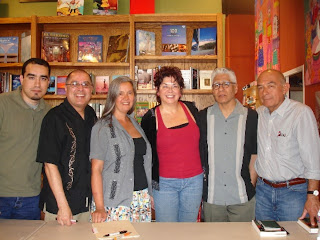
The writers answered questions that ranged from concerns about the demise of newspapers and what that means for writers, to dealing with the presumed contradiction between ethnic-specific and universal themes in fiction, to correcting a misconception that no one had written about the forced removal of Mexican laborers from the United States in the early years of the Twentieth Century, to why Lotusland is so damn important. Each of the writers brought their own perspective, intelligence, humor, and style to the table and it looked like the crowd enjoyed it all. You should'a been there.
 Alejandro Morales, professor at the University of California at Irvine and author of Barrio on the Edge, The Rag Doll Plagues, Waiting to Happen, The Captain of All These Men of Death, and several other works that chronicle the Chicano experience past, present and future. His presentation was loaded with Chicano Lit history - this guy has been there from the early days of the modern Chicano
Alejandro Morales, professor at the University of California at Irvine and author of Barrio on the Edge, The Rag Doll Plagues, Waiting to Happen, The Captain of All These Men of Death, and several other works that chronicle the Chicano experience past, present and future. His presentation was loaded with Chicano Lit history - this guy has been there from the early days of the modern Chicano  Literature movement.
Literature movement.
The hardest working man in the book business,
Daniel Olivas, author, editor, lawyer, family man, and all around nice guy. Daniel has worked tirelessly to present
Latinos in Lotusland to the reading public. Later this year his own collection of short stories,
Anywhere But L.A., will be published. Order it now. I've read it. It's an amazing collection.

s selection for
Lotusland, Sweet Time, is a chapter from her novel-in-progress. She's a professor of English at Irvine Valley College and some of her students were in the audience. They praised Lisa's commitment to teaching and thanked her for all she had done for them. You could see that she was truly an inspiration.

Sandra Ramos O'Briant has contributed to La Bloga (thank you, Sandra) as well as to several literary magazines. Her story in
Lotusland, Lana Turner Slept Here, is one of my favorites. She also has a story in
Hit List: The Best of Latino Mystery. Have to read that one soon.
 Victorio Barragán
Victorio Barragán teaches sociology and is completing a collection of stories and two novels. He gave some astute and provocative answers to many of the questions from the crowd. He also had a good time and smiled a lot, although you wouldn't know that from this photo. Nice guy.

The interloper from Denver seizes the mike and refuses to let go until Daniel Olivas wrenches it from his sweaty hands. When peace was restored, Daniel, Sandra, Manuel and Flo called it a day and enjoyed chile rellenos, tacos de pollo, tacos de birria, and a torta at the taquería across the street. Alejandro, Lisa and Victorio disappeared into the night. And the Latinos from Lotusland went back to Lotusland (or Irvine or Tustin), satisfied but eager for the next outing. You should'a been there.
event photos courtesy of Florencia Hernandez-Ramos
_____________________________
BITS AND PIECESLa Huelga MovieYou folks in Santa Ana - there's a free showing of the short flick
Viva La Causa, a documentary about
César Chávez and
Dolores Huerta, presented by the
Dolores Huerta Foundation and Fiesta Marketplace. The movie is scheduled for April 4 at 6:00 pm at the
Yost Theater, 307 N. Spurgeon Street, Santa Ana. It's an Orange County premiere. Call 626-716-0201 for more information.

 Enmascarados
Enmascarados
at the Gallista Gallery1913 S. Flores Street San Antonio, Texas 78204
April 11 6:00 pm - 10:00 pm

Acevedo InterviewJohn Kuebler, Media Coordinator for
El Centro Su Teatro (whose
XicanIndie Film Fest is now in full swing) interviewed Denver author
Mario Acevedo for the
Denver Urban Spectrum. Mario is described as a "loveable smart ass" - could be.
The interview is here.That's it -
Later.

El Centro Su Teatro, in collaboration with the Consulado General de Mexico and the Denver Film Society, proudly presents XicanIndie FilmFest XI: Latino World Cinema, April 2 – 5, 2009 at the Starz FilmCenter, 900 Auraria Parkway in Denver.
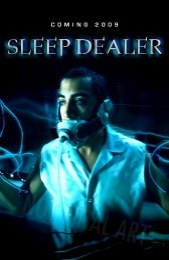
What began as a small celebration of independent Chicano film making, has, in a decade’s time, become the foremost Latino film festival in the region. This year’s XicanIndie will feature the Denver premiere of an award-winning and riveting new film from director Alex Rivera, Sleep Dealer; a beloved classic from Mexico’s golden age of cinema; a handful of exciting independent shorts - the Chones; and a special tribute to legendary movie producer Moctesuma Esparza (The Milagro Beanfield War, Gettysburg, Walkout).
Su Teatro announces the XicanIndie FilmFest XI opening night film: Amexicano (a Denver premiere)
Join us at 6:00 p.m. as we celebrate the living legacy of Chicano film producer
Moctesuma Esparza (
Ballad of Gregorio Cortez, Milagro Beanfield War, Selena, Walkout) followed by the Denver premiere of
Amexicano - the story of an unlikely friendship between a down and out Italian-American and a Mexicano day laborer.
“Pulses with the hum of city life”—
New York Daily News “Constantly unpredictable”—
Variety
April 2, 6:00 p.m. -- Opening Night Reception (Moctesuma Esparza will be in attendance); City and County of Denver recognizes April 2, 2009 as
Moctesuma Esparza Day; Su Teatro presents Esparza with the
XicanIndie Lifetime Achievement Award7:30 p.m. --
Amexicano (distributed by Moctesuma Esparza’s Maya Entertainment)
$15 Opening Night Reception & Film combo
Call El Centro Su Teatro for tickets: 303.296.0219. Check out complete festival details online at:
http://xicanindie.suteatro.org or the
Denver Film Society website.NEW BOOK A Not So Perfect Crime,Teresa Solana
A Not So Perfect Crime,Teresa SolanaBitter Lemon Press, March, 2009
Another day in Barcelona, another slimy politician’s wife is suspected of infidelity. Luis Font discovers a portrait of his wife in an exhibition that leads him to conclude he is being cuckolded by the artist. Concerned only about the potential political fallout, he hires twins Eduard and Pep, private detectives with a supposed knack for helping the wealthy with their “dirty laundry.” Their office is adorned with false doors leading to non-existent private rooms, a mysterious secretary who is always away and a broken laptop computer picked up on the street. The case turns ugly when Font’s wife is found poisoned by a marron glacé from a box of sweets delivered anonymously. This is a deftly plotted, bitingly funny mystery novel. A satire of Catalan politics and a fascinating insight into the life and habits of Barcelona’s inhabitants, diurnal and nocturnal. Winner of the
2007 Brigada 21 Prize for the
Best Catalan Mystery Novel.
SHORT STORY EVENTSDon't forget the group reading and Q&A for
Latinos in Lotusland scheduled for
March 28, 2009, 3:00 - 6:00 p.m.at
Librería Martínez, 1200 N. Main St., Santa Ana, CA 92701. Phone: 714-973-7900. Scheduled contributors to the anthology include
Lisa Alvarez, Conrad Romo, Victorio Barragan, Alejandro Morales, Sandra Ramos O'Briant, Manuel Ramos, and the esteemed editor,
Daniel Olivas.
And, this just in ... a reading and signing for
Hit List: The Best of Latino Mystery has been set for the
Tattered Cover, Colfax store (Denver) for
May 21 at 7:30 p.m. Join
Mario Acevedo and me at the Tattered as we read from our stories in the new anthology and celebrate this publishing milestone - the first short story collection devoted to Latino crime fiction writers. I will post a complete list of all scheduled
Hit List events (from New York to Houston to San Antonio to Denver to L.A.) in the weeks to come. Watch for it.
And while you are at it, watch for another interview with one of the people responsible for putting together
Hit List - coming soon.
Later.
Review: Primera Pagina. Poetry from the Latino Heartland.
Kansas City, MO: 2008
ISBN 978-0-9791291-1-7
Michael Sedano
A few weeks ago, at the National Latino Writers Conference, I had the pleasure of hearing several of the women read their work included in this welcome anthology coming to us out of Kansas City, Missouri. These are effective, competent voices that fit well into the encompassing genre of "Chicana Chicano" arts.

"Latino" in the subtitle lets the collection cover a lot of ground, but principally this collection features Chicana Chicano poets. Which is to say, the poems reflect many of the themes and images that have populated poesía chicana over the years.
Among the preponderant themes echoed in this collection is the "lost and ruined homeland" that evokes places like barrios or Aztlán. Here, the subtitle, "from the Latino Heartland" places all the works into that geographic perspective. We may write in Kansas, the theme suggests, but we're from someplace else, the same place as the rest of you, the rest of us.
One expression of place is Gabriela N. Lemmons' "Kansas," where the poet declares, "I know when they harvest winter wheat,/ when corn needs to be planted, and how/ close to God people think they are. / But I don't know one multi-tongued latino, / where I can buy pumpkin empanadas, / dulce de leche and De La Rosa Mazapán. / Whether La Llorona roams in white or black /in these parts and what creeks she frequents? / I cannot remember how/ a wetback smells anymore, / soon after he crosses el Río Grande-- / the vein of my roots meandering / in hues of azul."
Lemmons adopts a tactic of footnoting all her Spanish phrases for the English-only reader. Empanadas (italicized in the note, not in the poem) are pies; dulce de leche is caramel; mazapan (sans diacritic) is peanut butter candy; La Llorona is the legendary wailing woman (Mexican Tale); azul is blue.
Another commonly read theme, the Anglo as devil, the exploitation of gente by officialdom, comes in for an interesting twist in Chato Villalobos' "Brown Eyes in Blue". The twist is the poet writes in the voice of a police officer who believes his presence brings security and justice to his pueblo. Aware of the contradiction, the poet writes, "I hesitate before looking in the mirror / That's when visions of Malinche appear / Because nothing really looks out of place / Until I see the brown skin of my own face." Pride of position overcomes fear of contradiction as the poem resolves with the thought, "The barrio calls for me I can't refuse / 'Cause I know they'll be safe with brown eyes in blues."
Not every writer attempts to put an ethnic or cultural gloss on their work. For instance, José Faus' work covers 28 pages of work that defies its placement in a "Latina Latino" collection. In contrast, Xánath Caraza writes facing-page bilingual poems. Speaking of language, English is the mode of expression for these pages.
Primera Página is a delightful collection of relatively new voices--the opening poet is San Diego's Taco Shop Poet, Tomas Riley. Aside from the pleasure of finding promising new poets, I found an excellent approach to these poets is reading the women first, then the men. An opportunity for dialog emerges from this approach. Some women expose the brutality of abusive men, as when Linda Rodriguez' "P.O.W." recounts the savagery of sexual abuse of a 9-year old girl by her father. The men are oblivious to these charges. To them, women are objects for play and seduction, as in Andrés Rodriguez' "Chronicle of a Salvadorian Girl," whose saving grace is the man and woman are clueless together. I would think the follow-up volume will bring these disparate points of view into confrontation. Since the anthology is product of a collective, I hope they'll do this and let us see what emerges.
One Bit: Printmaking and BBQ in Highland Parque.
Grand Opening
Sunday, June 22, 2008 @ 5:00 pm
Sonia Romero’s Printmaking Studio
Museum of Traffic, LLC
and
Launching of community partner LACommons’s website (www.lacommons.org)
Sunday, June 22, 2008 starting at 5:00 pm
Please join us for a barbeque/barbacoa afternoon as we celebrate the new at the Avenue 50 Studio
Food ~ Music ~ Art
Plus, a demonstration of printmaking by Sonia Romero
We invite you to join us and bring a refreshment or food in celebration
Avenue 50 Studio(s), Inc.
131-135 No. Avenue 50
Highland Park, CA
90042
323/258-1435
Bit Two: Latinos in Lotusland reading and book signing.
 Among the major independent booksellers on the eastside of the Los Angeles basin is Vroman's, in Pasadena. The two locations don't stock a lot of Chicana Chicano literature, so it was a pleasant surprise to read that the store was to host an evening of writers featured in the Daniel Olivas-edited anthology.
Among the major independent booksellers on the eastside of the Los Angeles basin is Vroman's, in Pasadena. The two locations don't stock a lot of Chicana Chicano literature, so it was a pleasant surprise to read that the store was to host an evening of writers featured in the Daniel Olivas-edited anthology.
It was a pleasantly full house of readers and writers who attended to enjoy some stimulating presentations. Most encouraging was the energetic jostle after the readings and Q&A. Vroman's must have sold a goodly number of the increasingly popular title. I hope the attendance and sales persuade Vroman's to host more Chicana Chicano Latina Latino writers.
Sandra Ramos O’Briant. Lana Turner Slept Here.
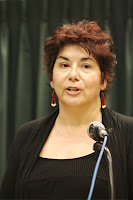 O'Briant clearly practiced her reading, plus she's an effective reader. But beyond that, O'Briant went to the extra effort to pare her story down to what she felt was a manageable time, and read from a typescript rather than the book. Two strangers in a chance encounter share painful marriage stories and learn that caring for others has a price, and it's probably worth it.
O'Briant clearly practiced her reading, plus she's an effective reader. But beyond that, O'Briant went to the extra effort to pare her story down to what she felt was a manageable time, and read from a typescript rather than the book. Two strangers in a chance encounter share painful marriage stories and learn that caring for others has a price, and it's probably worth it.
Victorio Barragán. Daylight Dreams.
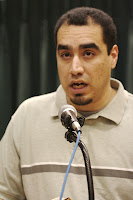 Barragan shared his first published work, a tale of bitter irony and crashing expectations. A shy man has admired a cute woman who rides his bus. He's worked up a romantic fantasy about the stranger. Today he will talk to her. In his dreams she will instantly respond and a long, happy relationship will come of it. Dashed. A slick jerk steals his woman from him and the bus pulls away with the woman happily flirting with the other guy. Carpe diem, loverboy.
Barragan shared his first published work, a tale of bitter irony and crashing expectations. A shy man has admired a cute woman who rides his bus. He's worked up a romantic fantasy about the stranger. Today he will talk to her. In his dreams she will instantly respond and a long, happy relationship will come of it. Dashed. A slick jerk steals his woman from him and the bus pulls away with the woman happily flirting with the other guy. Carpe diem, loverboy.
Conrad Romo. The Cement God.
 Romo's powerful voice enhances this gem of a boy-fatherhood story. Capturing small details of a boy's front stoop conversation with his grandfather, a master cement finisher, the tale sparkles with genuine warmth. The story favorably evokes the powerful cement-pouring scene from Richard Vasquez' novel, Chicano. In fact, Olivas has included that scene as the final entry of the anthology.
Romo's powerful voice enhances this gem of a boy-fatherhood story. Capturing small details of a boy's front stoop conversation with his grandfather, a master cement finisher, the tale sparkles with genuine warmth. The story favorably evokes the powerful cement-pouring scene from Richard Vasquez' novel, Chicano. In fact, Olivas has included that scene as the final entry of the anthology.
Lisa Alvarez. Sweet Time.
 Alvarez' mother-daughter-stepsister story carries the tension of a mother's final stay in the hospital. The writer successfully conveys the distance that grows between families split apart by serial monogamy and alcoholism. Alvarez' dry humor gives the story added zest, transforming what could be a dreary tale of regret into something positive.
Alvarez' mother-daughter-stepsister story carries the tension of a mother's final stay in the hospital. The writer successfully conveys the distance that grows between families split apart by serial monogamy and alcoholism. Alvarez' dry humor gives the story added zest, transforming what could be a dreary tale of regret into something positive.
Daniel Olivas. Bender.
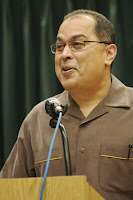 Olivas' metaphorical critter story has a lot of sexuality packed into such a tight space. Reprinted from his collection Devil Talk, it's a gem of perplexity that will have readers going back to page one to reassure themselves they've grasped what the writer told them. "Bender," as the other stories read that evening, is a delight.
Olivas' metaphorical critter story has a lot of sexuality packed into such a tight space. Reprinted from his collection Devil Talk, it's a gem of perplexity that will have readers going back to page one to reassure themselves they've grasped what the writer told them. "Bender," as the other stories read that evening, is a delight.
I'd like to encourage authors to develop fuller eye contact with the house. O'Briant's strategy of practicing and using a typescript allow her the luxury of pulling eyes off the page and looking out at her listeners. Too often a reader briefly glances up--I wonder if they even see what's before them--then glues the eyes to the page. Lecterns are unfriendly instruments. The slanted desktop makes it difficult to display the book. Any photo of an author reading will benefit from including the cover in the shot.
A Sadness in This Piece.
This email comes from Oscar Garza, Editor In Chief of Tu Ciudad Magazine.
Friends, sorry for the mass e-mail, but I have a lot of people to reach out to. If you have the June/July issue of Tu Ciudad—our third anniversary issue—hang on to it: it's the last one that will be published. Last Thursday, Emmis Communications announced that it is "suspending" publication of the magazine, which means that they're pulling the plug. Emmis is not to be blamed because, in fact, the company went far beyond the financial commitment they originally made to Ciudad. We simply couldn't sell enough advertising to succeed. For the past 14 months our Founder/Publisher, Jaime Gamboa, has been seeking additional investors, but his efforts—which continued even until last week—have been unsuccessful.
The media business is undergoing a revolution. Print, in particular, is in trouble (e.g., Los Angeles Times). The notion of killing trees to print words and pictures is increasingly archaic and expensive—as is the cost of mailing a magazine, which we were doing (for free) to 85,000 households.
That said, I am proud of what we produced at Ciudad and for the contribution we made to Latino cultural history. The most common response I heard from readers was: "Finally! I've been waiting for a magazine like this for a long time." And it was especially touching and bittersweet to hear such sentiments during the past few weeks while knowing that our possible demise was imminent.
My own future is undetermined at the moment. I have a few options and I'll let you know where I land. (This e-mail address will be operable until June 20. After that you can reach me at: [email protected].) But the first thing I'm going to do is wean myself off Tylenol PM, which I got hooked on to combat sleepness nights of magazine-related worry. (Maybe you'll see me on VH1’s “Celebrity Rehab.”)
One of my favorite magazines is No Depression, which celebrates all styles of American roots music. Coincidentally, it just published its final issue—a victim of two industries that are in flux. That magazine took its title from the Carter Family song, "No Depression in Heaven." And I too will take my cue from the song: there's no depression in the closing of Ciudad, only pride and gratitude.
Thanks to all of you for being loyal readers and supporters.
That's it for June's third Tuesday. Next week, I'll be looking at Akashic's Trinidad Noir, another in the publisher's growing noir series. So far, so good, but then, I've just started it.
ate,
mvs
La Bloga welcomes your comments on today's or any post. Simply click the "comments" counter below. La Bloga invites guest columnists. Haz klick aquí to declare your interest in sharing a review, an extended comment, an arts or culture event, or something of note.
LOTUSLAND AT THE TATTERED COVER
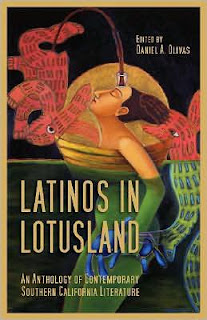
On May 21,
Rudy Ch. Garcia and I hosted a reading and signing event for
Latinos In Lotusland at the Colfax Avenue version of the
Tattered Cover Bookstore in Denver. The bookstore people, as always, were gracious and accommodating; the audience was attentive and eager to hear about this amazing collection of short stories that features more than thirty writers; and the night turned into one of those where everything fell into place and a great time was had by all. Camaraderie and affection filled the air as old friends greeted one another with enthusiastic hugs, while strangers shook hands and introduced themselves. Everyone was primed for a literary evening, and no one left disappointed.
A great crowd showed up for the event.
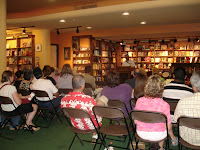
I opened the evening with some comments about
Daniel Olivas's original call for "provocative stories ... from social realism to
cuentos de fantasma and anything in between" as long as Los Angeles played an integral role. I pointed out that one of Daniel's goals was to bring together some of the "best contemporary Latino fiction" about Los Angeles. And then Rudy and I set out to demonstrate to the audience how well Daniel had succeeded in reaching his goal.
We had decided to give our audience as broad a taste as possible of the varied delicacies in the book by reading short samples from several of the stories. My selections focused on stories about writers, so I proceeded with the opening paragraphs from Luis J. Rodriguez's Miss East L.A., which made the audience laugh, even though there was a certain edge to the laughter. Then a few pithy paragraphs from Wayne Rapp's Just Seven Minutes that made the audience smile knowingly and laugh again; and finally a couple of paragraphs from my own The 405 Is Locked Down.
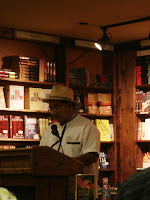
Rudy continued, in his inimitable style, with more short pieces. He opened with a page from
Luis Alberto Urrea's The White Girl, quickly moved to several paragraphs from
Frederick Luis Aldama (A Long Story Cut Short); came on strong with choice words from
Kathleen de Azevedo's The True Story; and finished with his own
LAX Confidential. We both wished we had more time to read more selections, but the ones we did manage to fit in were applauded enthusiastically by the audience. Later, several attendees told us that they appreciated the way we presented the stories, whetting their appetites, leaving them with the desire to hear more and, thus, to buy and read the book.
We answered questions: were there any pachuco stories in the collection (check out
Kid Zopilote by
Mario Suárez); why is profanity necessary in some stories and not in others (Rudy handled that); would we rather write short stories or novels (we like shorts, we like novels, we just want to write); is there a bias in the publishing world against writers from mid-America (h-m-m-m).
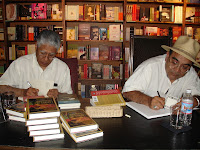
We finished by signing books for those who wanted autographs. We mingled a bit, took a few photos, then several of us ended up at the nearby
Neighborhood Flix Café bar, where old and sometimes class
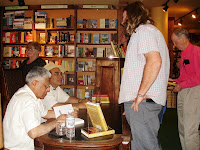
ic movies show continuously on the walls, and you can take your beverage of choice into the theater to watch movies like
The Favor, Anamorph and
21. We toasted the book, toasted one another, and speculated about another short story collection, maybe something like
Latinos in the Rocky Mountains. What a night.
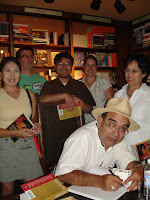 Rudy surrounded by his proud family at his first reading for a published story.NEW FROM NEW MEXICO PRESS
Rudy surrounded by his proud family at his first reading for a published story.NEW FROM NEW MEXICO PRESSThe following is from the
UNM Press Fall 2008 catalog:
 The Song of Jonah Gene Guerin
The Song of Jonah Gene GuerinIn this modern retelling of the Book of Jonah, Fr. Jon, like his biblical counterpart, rejects the call from God to his own “Nineveh.” In an ironic echoing of Jonah’s fate, the priest is swallowed up by a metaphorical whale and deposited on the very shores of the place he was determined to avoid. Nueve Niños, with its long-standing reputation for mistreating its pastors, is an alien world that will prove his ultimate testing ground. Through his slow, often reluctant immersion into the lives of the villagers, Fr. Jon eventually gains insight into himself and his ultimate calling.
Gene Guerin’s novel
Cottonwood Saints (UNM Press) won the
Mountains and Plains 2007 Regional Book Award for Adult Fiction and the
2006 Premio Aztlán for first-time Hispanic writers. Born and raised in New Mexico, he presently lives in Denver.
 ChupaCabra and the Roswell UFO
ChupaCabra and the Roswell UFO
Rudolfo Anaya
In this second ChupaCabra mystery, Professor Rosa Medina has just arrived in Santa Fe where she meets Nadine, a mysterious sixteen-year-old who insists that the two of them travel to Roswell, New Mexico. Nadine is convinced that C-Force, a secret government agency, has decoded the DNA of ChupaCabra and an extraterrestrial. If the two genomes are combined, a new and horrific life form will be created.
In this fast-paced mystery, Anaya expands the ChupaCabra folklore into a metaphor that deals with the new powers inherent in science. Is ChupaCabra a beast in Latino folktales, used to frighten children, or a lost species being manipulated by C-Force? Rosa’s life hangs in the balance as she and her young accomplice try to find a way to stop C-Force before its mad scientists create a monster.
Rudolfo Anaya has received numerous awards, including the
Premio Quinto Sol, the national Chicano literary award, the
National Medal of Arts for literature, the
PEN Center West Award for Fiction, the
American Book Award from The Before Columbus Foundation, the
Mexican Medal of Friendship from the Mexican Consulate, and the
Western Literature Association’s Distinguished Achievement Award.
 Juan the Bear and the Water of Life La Acequia de Juan del Oso
Juan the Bear and the Water of Life La Acequia de Juan del Oso
Retold and Translated by Enrique R. Lamadrid and Juan Estevan Arellano; Illustrated by Amy CórdovaLa Acequia del Rito y la Sierra in the Mora Valley is the highest and most famous traditional irrigation system in New Mexico. It carries water up and over a mountain ridge and across a sub-continental divide, from the tributaries of the Río Grande to the immense watershed of the Mora, Canadian, Arkansas, and Mississippi Rivers. The names and stories of those who created this acequia to sustain their communities have mostly been lost and replaced by myths and legends. Now, when children ask, some parents attribute the task of moving mountains and changing the course of rivers to Juan del Oso, the stouthearted man whose father was
a bear.
From the mountains of northern Spain to the Andes in South America, Spanish-speaking people have told ancient legends of Juan del Oso and his friends. In this children’s tale, agriculturalist Juan Estevan Arellano and folklorist Enrique Lamadrid share a unique version of a celebrated story that has been told in northern New Mexico for centuries.
Enrique R. Lamadrid, professor of Spanish folklore and literature at the University of New Mexico, was awarded the
Americo Paredes Prize in recognition of his work as a cultural activist. Juan Estevan Arellano, a native of Embudo, New Mexico, is a poet, artist, writer, and agronomist. He is an expert in traditional Spanish/Moorish agriculture and the sustaining of traditional crops originally brought to New Mexico from Europe and Central Mexico. Amy Córdova lives in Taos, New Mexico, where she is co-owner of
Enger-Córdova Fine Art. She is also an educator and has illustrated many children’s books.
Later.
 One of the main reasons I started this website was to ask the questions that I never had answered during graduate school.
One of the main reasons I started this website was to ask the questions that I never had answered during graduate school.
I'm sorry if I sound like a broken record, but I think all fledgling writers need to know how published authors made it to their first book. I ask every writer a simple, crucial question: How did you survive the hard times, how did you balance your writing life and your day job?
Today, I asked Brian Francis Slattery, a first-time novelist and editor who rocked the literary world with his trippy new novel, Spaceman Blues.
His answer will surprise and hopefully inspire you, part of my deceptively simple feature, Five Easy Questions. In the spirit of Jack Nicholson's mad piano player, I run a weekly set of quality interviews with writing pioneers—delivering some practical, unexpected advice about web writing.
Jason Boog:
You have a day job as an editor. How do you find time and energy to balance your day job responsibilities and your creative writing side? How did you stay sane during those early lean years as a graduate student, writing this book with what I imagine was a pretty crowded schedule?
Brian Francis Slattery:
That's a good question. I'm not as disciplined about it as I should be; I just try to find time when I can. Continue reading...

 "At an all night cockfighting tournament in Huehuetenango, to which I'd gotten a ride with a man in a black SUV who'd accidentally, intentionally let hundred-dollar bills fall from his pocket when he reached for his money roll to buy a bear, it seemed like half of the people there had been to the United States and back."
"At an all night cockfighting tournament in Huehuetenango, to which I'd gotten a ride with a man in a black SUV who'd accidentally, intentionally let hundred-dollar bills fall from his pocket when he reached for his money roll to buy a bear, it seemed like half of the people there had been to the United States and back."
That's Brian Francis Slattery describing a real-life trip to Guatemala that inspired one of the most violent, vivid scenes in his novel, Spaceman Blues. Guatemala is one of my favorite places, and his travel writing nailed some dark and beautiful things about the country.
This first-time novelist is my special guest this week, and today he discusses the research and politics of immigration swirling around his novel.
Welcome to my deceptively simple feature, Five Easy Questions. In the spirit of Jack Nicholson's mad piano player, I run a weekly set of quality interviews with writing pioneers—delivering some practical, unexpected advice about web writing.
Jason Boog:
How did you convert your real-life travels through Guatemala into hallucinatory interludes in your novel? In other words, what's your advice for writers as they travel to new places, how can they capture the experience in a creative way like you did?
Brian Francis Slattery:
The parts that physically describe Guatemala I tried to do as accurately as I could; allusions to what happened during Guatemala's civil war are taken from what people there told me and from what I learned through reading about the place. Continue reading...

 "They will return to Guatemala, to Ecuador, and buy land, a small fruit plantation, farm equipment, two delivery trucks, they will hire more men to work alongside them and prosper. And when they retire to a hammock on the coast, they will send mocking pictures to immigration authorities, the Guatemalan army, and the Ecuadorian government, financial statements with nasty drawings in the margins. You sold us out early, but we were better than that. See how you cut us short; see how we rose above."
"They will return to Guatemala, to Ecuador, and buy land, a small fruit plantation, farm equipment, two delivery trucks, they will hire more men to work alongside them and prosper. And when they retire to a hammock on the coast, they will send mocking pictures to immigration authorities, the Guatemalan army, and the Ecuadorian government, financial statements with nasty drawings in the margins. You sold us out early, but we were better than that. See how you cut us short; see how we rose above."
That's Brian Francis Slattery writing about immigrant dreams in Spaceman Blues--a hybrid of science fiction, political science, and kung-fu special effects.
This first-time novelist is my special guest this week, and today he tells us how he constructed his fantastical landscape without sounding like a guy playing one long game of Dungeons & Dragons.
Welcome to my deceptively simple feature, Five Easy Questions. In the spirit of Jack Nicholson's mad piano player, I run a weekly set of quality interviews with writing pioneers—delivering some practical, unexpected advice about web writing.
Jason Boog:
While your book has a number of science fiction elements, it is firmly grounded in the contemporary immigrant scene in New York City. What inspired you to take these everyday communities and turn them into something fantastical? How did you research and write these vivid scenes set in immigrant community settings--especially the "underground economies" that captivated your imagination?
Brian Francis Slattery:
Well, issues dealing with migration and the informal economy are kind of an obsession of mine--continue reading...

 Nobody writes subheadings anymore.
Nobody writes subheadings anymore.
Think about 19th century English novels with the great chapter divisions that read "In Which Our Dashing Hero Meets The Damsel Of His Dreams And Loses Her To An Untimely Accident." I've loved the technique since I was a kid, and I don't even know if there is a literary term for these sub-titles.
So imagine my suprise when I read Spaceman Blues by Brian Francis Slattery, a first-time novelist who broke up his hallucinatory novel with helpful subheadings--a term we will christen "literary headlines."
Slattery's our special guest this week, and today, he convened The World's First, Briefest Writing Workshop Dedicated Solely To The Art Of The Literary Headline.
Welcome to my deceptively simple feature, Five Easy Questions. In the spirit of Jack Nicholson's mad piano player, I run a weekly set of quality interviews with writing pioneers—delivering some practical, unexpected advice about web writing.
Jason Boog:
Why did you pick the form? How did you choose the names for the subheadings? Any advice for writers looking to use this technique, any books we should read that exemplify the form?
Brian Francis Slattery:
I don't know if there's a term for it either. Continue reading...

 “The rest of the band waits, they're letting the groove get in the pocket, hit bottom. It does; and now two drummers join in, they weave a polyrhythm that brings in one guitar and some pops from a banjo, oh this groove is young, but it's growing, and people are starting to move. Now a singer steps up to the mike, puts out some blues that two more singers turn to gospel, harmonies deep and wide that make you want to believe.”
“The rest of the band waits, they're letting the groove get in the pocket, hit bottom. It does; and now two drummers join in, they weave a polyrhythm that brings in one guitar and some pops from a banjo, oh this groove is young, but it's growing, and people are starting to move. Now a singer steps up to the mike, puts out some blues that two more singers turn to gospel, harmonies deep and wide that make you want to believe.”
That's a blazing passage from Spaceman Blues by Brian Francis Slattery, a first-time novelist who took his experiences with music, immigrants, travel, and politics, boiling them in a hallucinatory stew.
He's our special guest this week, talking about writing tips, day job survival, novel publishing, and musical language.
Welcome to my deceptively simple feature, Five Easy Questions. In the spirit of Jack Nicholson's mad piano player, I run a weekly set of quality interviews with writing pioneers—delivering some practical, unexpected advice about web writing.
Jason Boog:
Your novel sings. There are remarkable musical sections sprinkled throughout, and your sentences sound stunning when I read them out loud. You play music in real life. How did you inject music into your prose, thematically and line-by-line? Any advice for fledgling writers looking to make their prose sound more musical, more rhythmic? What did you listen to while you wrote the book?
Brian Francis Slattery:
I'm so glad you hear the groove in my writing--it makes it more fun for me to write like that, and I hope it's more fun for readers to read it. Continue reading...









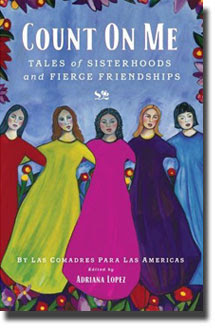



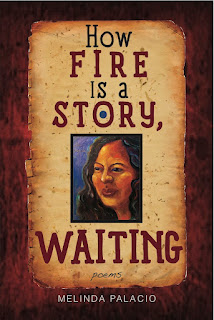

































looking forward to an autry cerebration of lotusland. think about joining the crowd.
I'll be thinking of you all tomorrow afternoon - I remember the Lotusland reading at Martinez Books in Santa Ana - we had a great time, a true celebration, and Daniel was very much the glue that held it together. I'm sure the Autry event will be just as memorable. Each time I pick up Lotusland I discover something new, even in stories I've already read. It's a great collection. Thank you, Daniel
I am so moved by all of these warm, kind words! I have been enriched by "Latinos in Lotusland" in ways I can't express. I wish I could have all the contributors there tomorrow (including the ones who have left this mortal world)...but it will be fun and a great celebration of literature. I hope many of La Bloga's readers can make it to the Autry.